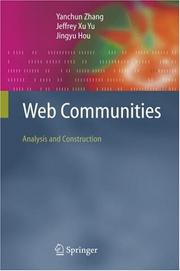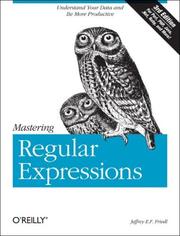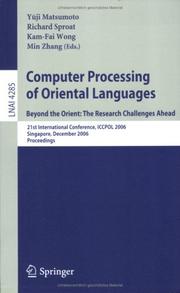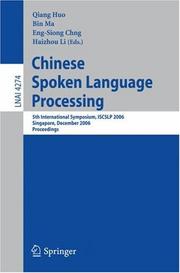| Listing 1 - 10 of 17 | << page >> |
Sort by
|

ISBN: 1280608668 9786610608669 3540277390 3540277374 Year: 2006 Publisher: Berlin ; New York : Springer,
Abstract | Keywords | Export | Availability | Bookmark
 Loading...
Loading...Choose an application
- Reference Manager
- EndNote
- RefWorks (Direct export to RefWorks)
Due to the lack of a uniform schema for Web documents and the sheer amount and dynamics of Web data, both the effectiveness and the efficiency of information management and retrieval of Web data is often unsatisfactory when using conventional data management techniques. Web community, defined as a set of Web-based documents with its own logical structure, is a flexible and efficient approach to support information retrieval and to implement various applications. Zhang and his co-authors explain how to construct and analyse Web communities based on information like Web document contents, hyperlinks, or user access logs. Their approaches combine results from Web search algorithms, Web clustering methods, and Web usage mining. They also detail the necessary preliminaries needed to understand the algorithms presented, and they discuss several successful existing applications. Researchers and students in information retrieval and Web search find in this all the necessary basics and methods to create and understand Web communities. Professionals developing Web applications will additionally benefit from the samples presented for their own designs and implementations.
Web search engines. --- Vector spaces. --- Text processing (Computer science) --- World Wide Web. --- W3 (World Wide Web) --- Web (World Wide Web) --- World Wide Web (Information retrieval system) --- WWW (World Wide Web) --- Hypertext systems --- Multimedia systems --- Internet --- Processing, Text (Computer science) --- Database management --- Electronic data processing --- Information storage and retrieval systems --- Word processing --- Linear spaces --- Linear vector spaces --- Algebras, Linear --- Functional analysis --- Vector analysis --- Web searching --- World Wide Web searching --- Internet searching --- Search engines --- Web portals --- World Wide Web --- Subject access

ISBN: 0596528124 9780596528126 Year: 2006 Publisher: Sebastopol O'Reilly & Associates
Abstract | Keywords | Export | Availability | Bookmark
 Loading...
Loading...Choose an application
- Reference Manager
- EndNote
- RefWorks (Direct export to RefWorks)
A regular expression (regex) is a pattern that describes a set of strings. Regular expressions are used for advanced context-sensitive searches (e.g. parsing data streams, data mining) and text modifications. They can be found in many advanced editors (e.g. vi, Emacs), in parser programs (e.g. grep) and in languages (e.g. Perl), mostly in a UNIX environment. This book is the standard work on regexes.
Programming --- Computer programming --- Perl (Computer program language) --- Text processing (Computer science) --- 681.3 --- Internet : scripttalen --- Programmeren --- Processing, Text (Computer science) --- Database management --- Electronic data processing --- Information storage and retrieval systems --- Word processing --- Pathologically Eclectic Rubbish Lister (Computer program language) --- Practical Extraction and Report Language (Computer program language) --- Scripting languages (Computer science) --- Computers --- Electronic computer programming --- Electronic digital computers --- Programming (Electronic computers) --- Coding theory --- Regular expressions --- 004.4 --- Reguliere expressie

ISBN: 128070179X 9786610701797 3540343369 354025031X 9783540250319 Year: 2006 Publisher: Berlin Springer
Abstract | Keywords | Export | Availability | Bookmark
 Loading...
Loading...Choose an application
- Reference Manager
- EndNote
- RefWorks (Direct export to RefWorks)
The areas of natural language processing and computational linguistics have continued to grow in recent years, driven by the demand to automatically process text and spoken data. With the processing power and techniques now available, research is scaling up from lab prototypes to real-world, proven applications. This book teaches the principles of natural language processing, first covering linguistics issues such as encoding, entropy, and annotation schemes; defining words, tokens and parts of speech; and morphology. It then details the language-processing functions involved, including part-of-speech tagging using rules and stochastic techniques; using Prolog to write phase-structure grammars; parsing techniques and syntactic formalisms; semantics, predicate logic and lexical semantics; and analysis of discourse, and applications in dialog systems. The key feature of the book is the author's hands-on approach throughout, with extensive exercises, sample code in Prolog and Perl, and a detailed introduction to Prolog. The reader is supported with a companion website that contains teaching slides, programs, and additional material. The book is suitable for researchers and students of natural language processing and computational linguistics.
Computer science. --- Programming languages (Electronic computers). --- Artificial intelligence. --- Text processing (Computer science). --- Computational linguistics. --- Computer Science. --- Artificial Intelligence (incl. Robotics). --- Computational Linguistics. --- Programming Languages, Compilers, Interpreters. --- Document Preparation and Text Processing. --- Language Translation and Linguistics. --- Automatic language processing --- Language and languages --- Language data processing --- Linguistics --- Natural language processing (Linguistics) --- Applied linguistics --- Cross-language information retrieval --- Mathematical linguistics --- Multilingual computing --- Processing, Text (Computer science) --- Database management --- Electronic data processing --- Information storage and retrieval systems --- Word processing --- AI (Artificial intelligence) --- Artificial thinking --- Electronic brains --- Intellectronics --- Intelligence, Artificial --- Intelligent machines --- Machine intelligence --- Thinking, Artificial --- Bionics --- Cognitive science --- Digital computer simulation --- Logic machines --- Machine theory --- Self-organizing systems --- Simulation methods --- Fifth generation computers --- Neural computers --- Computer languages --- Computer program languages --- Computer programming languages --- Machine language --- Languages, Artificial --- Informatics --- Science --- Data processing --- Natural language processing (Computer science) --- Perl (Computer program language) --- Prolog (Computer program language) --- Pathologically Eclectic Rubbish Lister (Computer program language) --- Practical Extraction and Report Language (Computer program language) --- Scripting languages (Computer science) --- NLP (Computer science) --- Artificial intelligence --- Human-computer interaction --- Semantic computing --- Information Technology --- Artificial Intelligence --- 800.51 --- 800.51 Computerlinguistiek --- Computerlinguistiek

ISBN: 9783540466499 3540466495 3540466509 Year: 2006 Publisher: Berlin : Springer,
Abstract | Keywords | Export | Availability | Bookmark
 Loading...
Loading...Choose an application
- Reference Manager
- EndNote
- RefWorks (Direct export to RefWorks)
Computer algorithms --- Machine learning --- Algorithmes --- Apprentissage automatique --- Congresses. --- Congrès --- Computer Science --- Mechanical Engineering - General --- Mechanical Engineering --- Engineering & Applied Sciences --- Information Technology --- Artificial Intelligence --- Computer science. --- Computers. --- Algorithms. --- Mathematical logic. --- Artificial intelligence. --- Text processing (Computer science). --- Computer Science. --- Artificial Intelligence (incl. Robotics). --- Computation by Abstract Devices. --- Algorithm Analysis and Problem Complexity. --- Mathematical Logic and Formal Languages. --- Document Preparation and Text Processing. --- Processing, Text (Computer science) --- Database management --- Electronic data processing --- Information storage and retrieval systems --- Word processing --- AI (Artificial intelligence) --- Artificial thinking --- Electronic brains --- Intellectronics --- Intelligence, Artificial --- Intelligent machines --- Machine intelligence --- Thinking, Artificial --- Bionics --- Cognitive science --- Digital computer simulation --- Logic machines --- Machine theory --- Self-organizing systems --- Simulation methods --- Fifth generation computers --- Neural computers --- Algebra of logic --- Logic, Universal --- Mathematical logic --- Symbolic and mathematical logic --- Symbolic logic --- Mathematics --- Algebra, Abstract --- Metamathematics --- Set theory --- Syllogism --- Algorism --- Algebra --- Arithmetic --- Automatic computers --- Automatic data processors --- Computer hardware --- Computing machines (Computers) --- Electronic calculating-machines --- Electronic computers --- Hardware, Computer --- Computer systems --- Cybernetics --- Calculators --- Cyberspace --- Informatics --- Science --- Foundations --- Computer software. --- Natural language processing (Computer science). --- Artificial Intelligence. --- Natural Language Processing (NLP). --- NLP (Computer science) --- Artificial intelligence --- Human-computer interaction --- Semantic computing --- Software, Computer

ISBN: 9783540373346 3540373349 3540373365 Year: 2006 Publisher: Berlin ; New York : Springer,
Abstract | Keywords | Export | Availability | Bookmark
 Loading...
Loading...Choose an application
- Reference Manager
- EndNote
- RefWorks (Direct export to RefWorks)
Natural language processing (Computer science) --- Traitement automatique des langues naturelles --- Congresses. --- Congrès --- Computer Science --- Mechanical Engineering - General --- Engineering & Applied Sciences --- Mechanical Engineering --- Congresses --- Information Technology --- Artificial Intelligence --- Computer science. --- Mathematical logic. --- Information storage and retrieval. --- Artificial intelligence. --- Text processing (Computer science). --- Computational linguistics. --- Computer Science. --- Language Translation and Linguistics. --- Artificial Intelligence (incl. Robotics). --- Mathematical Logic and Formal Languages. --- Information Storage and Retrieval. --- Document Preparation and Text Processing. --- Automatic language processing --- Language and languages --- Language data processing --- Linguistics --- Natural language processing (Linguistics) --- Applied linguistics --- Cross-language information retrieval --- Mathematical linguistics --- Multilingual computing --- Processing, Text (Computer science) --- Database management --- Electronic data processing --- Information storage and retrieval systems --- Word processing --- AI (Artificial intelligence) --- Artificial thinking --- Electronic brains --- Intellectronics --- Intelligence, Artificial --- Intelligent machines --- Machine intelligence --- Thinking, Artificial --- Bionics --- Cognitive science --- Digital computer simulation --- Logic machines --- Machine theory --- Self-organizing systems --- Simulation methods --- Fifth generation computers --- Neural computers --- Algebra of logic --- Logic, Universal --- Mathematical logic --- Symbolic and mathematical logic --- Symbolic logic --- Mathematics --- Algebra, Abstract --- Metamathematics --- Set theory --- Syllogism --- Informatics --- Science --- Data processing --- Natural language processing (Computer science). --- Information storage and retrieva. --- Natural Language Processing (NLP). --- Artificial Intelligence. --- NLP (Computer science) --- Artificial intelligence --- Human-computer interaction --- Semantic computing --- Information storage and retrieval systems. --- Automatic data storage --- Automatic information retrieval --- Automation in documentation --- Computer-based information systems --- Data processing systems --- Data storage and retrieval systems --- Discovery systems, Information --- Information discovery systems --- Information processing systems --- Information retrieval systems --- Machine data storage and retrieval --- Mechanized information storage and retrieval systems --- Computer systems --- Electronic information resources --- Data libraries --- Digital libraries --- Information organization --- Information retrieval

ISBN: 9783540496670 354049667X 3540496688 Year: 2006 Publisher: Berlin ; New York : Springer,
Abstract | Keywords | Export | Availability | Bookmark
 Loading...
Loading...Choose an application
- Reference Manager
- EndNote
- RefWorks (Direct export to RefWorks)
This book constitutes the thoroughly refereed proceedings of the 21st International Conference on Computer Processing of Oriental Languages, ICCPOL 2006, held in Singapore in December 2006, colocated with ISCSLP 2006, the 5th International Symposium on Chinese Spoken Language Processing. The 36 revised full papers and 20 revised short papers presented were carefully reviewed and selected from 169 submissions. The papers are organized in topical sections on information retrieval, document classification, questions and answers, summarization, machine translation, word segmentation, chunking, abbreviation expansion, writing-system issues, parsing, semantics, and lexical resources.
Oriental languages --- Data processing --- Congresses. --- Computer Science --- East Asian Languages & Literatures --- Mechanical Engineering - General --- Engineering & Applied Sciences --- Mechanical Engineering --- Languages & Literatures --- Information Technology --- Artificial Intelligence --- Languages, Oriental --- Computer science. --- Algorithms. --- Mathematical logic. --- Data mining. --- Artificial intelligence. --- Text processing (Computer science). --- Computational linguistics. --- Computer Science. --- Language Translation and Linguistics. --- Artificial Intelligence (incl. Robotics). --- Mathematical Logic and Formal Languages. --- Data Mining and Knowledge Discovery. --- Algorithm Analysis and Problem Complexity. --- Document Preparation and Text Processing. --- Automatic language processing --- Language and languages --- Language data processing --- Linguistics --- Natural language processing (Linguistics) --- Applied linguistics --- Cross-language information retrieval --- Mathematical linguistics --- Multilingual computing --- Processing, Text (Computer science) --- Database management --- Electronic data processing --- Information storage and retrieval systems --- Word processing --- AI (Artificial intelligence) --- Artificial thinking --- Electronic brains --- Intellectronics --- Intelligence, Artificial --- Intelligent machines --- Machine intelligence --- Thinking, Artificial --- Bionics --- Cognitive science --- Digital computer simulation --- Logic machines --- Machine theory --- Self-organizing systems --- Simulation methods --- Fifth generation computers --- Neural computers --- Algorithmic knowledge discovery --- Factual data analysis --- KDD (Information retrieval) --- Knowledge discovery in data --- Knowledge discovery in databases --- Mining, Data --- Database searching --- Algebra of logic --- Logic, Universal --- Mathematical logic --- Symbolic and mathematical logic --- Symbolic logic --- Mathematics --- Algebra, Abstract --- Metamathematics --- Set theory --- Syllogism --- Algorism --- Algebra --- Arithmetic --- Informatics --- Science --- Foundations --- Natural language processing (Computer science). --- Computer software. --- Natural Language Processing (NLP). --- Artificial Intelligence. --- Software, Computer --- Computer systems --- NLP (Computer science) --- Artificial intelligence --- Human-computer interaction --- Semantic computing

ISBN: 9783540454625 3540454624 3540454640 Year: 2006 Publisher: Berlin : Springer,
Abstract | Keywords | Export | Availability | Bookmark
 Loading...
Loading...Choose an application
- Reference Manager
- EndNote
- RefWorks (Direct export to RefWorks)
The Brazilian Arti?cial Intelligence (AI) community decided in 2004 to organize an International Joint Conference, joining IBERAMIA 2006 (the 10th Ibero-American Arti?cial Intelligence Conference), SBIA 2006 (the 18th Brazilian Arti?cial Int- ligence Symposium), and SBRN 2006 (the 9th Brazilian Neural Networks Sym- sium). This decision was a consequence of the successful event organized in 2000, when the First International Joint Conference IBERAMIA/ SBIA 2000 (7th Ibero- American Arti?cial Intelligence Conference and 15th Brazilian Arti?cial Intel- gence Symposium) occurred in Brazil. Moreover, in 2006 the arti?cial intelligence community celebrated the golden anniversary of the 1956 Dartmouth Conference that marked the beginning of arti?cial intelligence as a research ?eld. th SBIA 2006 was the 18 conference of the SBIA conference series, which is the leading Brazilian conference for the presentation of AI research and applications. Since 1995, SBIA has become an international conference, with papers written in English, an international Program Committee, and proceedings published in Springer’s Lecture Notes in Arti?cial Intelligence (LNAI) series. th IBERAMIA 2006 was the 10 conference of the IBERAMIA conference - ries, which has been one of the most suitable forums for Ibero-American AI researchers (from South and Central American countries, Mexico, Spain and Portugal) to present their results. Following the SBIA and EPIA (Portuguese Conference on AI) experiences, from IBERAMIA 1998 on, it has also become an international conference with proceedings published in Springer’s LNAI series.
Artificial intelligence --- Intelligence artificielle --- Congresses. --- Congrès --- Computer Science --- Mechanical Engineering - General --- Engineering & Applied Sciences --- Mechanical Engineering --- Information Technology --- Artificial Intelligence --- Computer science. --- Algorithms. --- Computer logic. --- Mathematical logic. --- Artificial intelligence. --- Text processing (Computer science). --- Computational linguistics. --- Computer Science. --- Artificial Intelligence (incl. Robotics). --- Mathematical Logic and Formal Languages. --- Language Translation and Linguistics. --- Document Preparation and Text Processing. --- Algorithm Analysis and Problem Complexity. --- Logics and Meanings of Programs. --- Automatic language processing --- Language and languages --- Language data processing --- Linguistics --- Natural language processing (Linguistics) --- Applied linguistics --- Cross-language information retrieval --- Mathematical linguistics --- Multilingual computing --- Processing, Text (Computer science) --- Database management --- Electronic data processing --- Information storage and retrieval systems --- Word processing --- AI (Artificial intelligence) --- Artificial thinking --- Electronic brains --- Intellectronics --- Intelligence, Artificial --- Intelligent machines --- Machine intelligence --- Thinking, Artificial --- Bionics --- Cognitive science --- Digital computer simulation --- Logic machines --- Machine theory --- Self-organizing systems --- Simulation methods --- Fifth generation computers --- Neural computers --- Algebra of logic --- Logic, Universal --- Mathematical logic --- Symbolic and mathematical logic --- Symbolic logic --- Mathematics --- Algebra, Abstract --- Metamathematics --- Set theory --- Syllogism --- Computer science logic --- Logic, Symbolic and mathematical --- Algorism --- Algebra --- Arithmetic --- Informatics --- Science --- Data processing --- Foundations --- Natural language processing (Computer science). --- Computer software. --- Logic design. --- Artificial Intelligence. --- Natural Language Processing (NLP). --- Design, Logic --- Design of logic systems --- Digital electronics --- Electronic circuit design --- Logic circuits --- Switching theory --- Software, Computer --- Computer systems --- NLP (Computer science) --- Human-computer interaction --- Semantic computing

ISBN: 9783540453741 3540453741 3540460489 Year: 2006 Publisher: Berlin ; New York : Springer,
Abstract | Keywords | Export | Availability | Bookmark
 Loading...
Loading...Choose an application
- Reference Manager
- EndNote
- RefWorks (Direct export to RefWorks)
The two premier annual European conferences in the areas of machine learning anddatamining havebeencollocatedeversincethejointconferenceinFreiburg, Germany,2001. The European Conference on Machine Learning wasestablished 20 years ago, when the ?rst European Working Session on Learning was held in Orsay, France, in 1986. The conference is growing, and is more lively than ever. The European Conference on Principles and Practice of Knowledge Discovery in Databasescelebratesits tenth anniversary;the ?rst PKDD took place in 1997 in Trondheim, Norway. Over the years, the ECML/PKDD series has evolved into one of the largest and most selective international conferences in these areas, the only one that provides a common forum for the two closely related ?elds. In 2006, the 6th collocated ECML/PKDD took place during September 18-22, when the Humboldt-Universität zu Berlin hosted the 17th European Conference on Machine Learning (ECML) and the 10th European Conference on Principles and Practice of Knowledge Discovery in Databases (PKDD). The successful model of a hierarchical reviewing process that was introduced last year for the ECML/PKDD 2005 in Porto has been taken over in 2006. We nominated 32 Area Chairs, each of them responsible for several closely related research topics. Suitable areas were selected on the basis of the submission s- tistics for ECML/PKDD 2005 to ensure a proper load balance among the Area Chairs. For the ?rst time, a joint Program Committee was nominated for the two conferences, consisting of 280 renowned researchers,mostly proposed by the AreaChairs.
Data mining --- Database searching --- Exploration de données (Informatique) --- Bases de données --- Congresses. --- Congrès --- Interrogation --- Computer Science --- Mechanical Engineering - General --- Engineering & Applied Sciences --- Mechanical Engineering --- Information Technology --- Artificial Intelligence --- Computer science. --- Data structures (Computer science). --- Mathematical statistics. --- Database management. --- Information storage and retrieval. --- Artificial intelligence. --- Text processing (Computer science). --- Computer Science. --- Data Structures, Cryptology and Information Theory. --- Artificial Intelligence (incl. Robotics). --- Database Management. --- Information Storage and Retrieval. --- Probability and Statistics in Computer Science. --- Document Preparation and Text Processing. --- Processing, Text (Computer science) --- Database management --- Electronic data processing --- Information storage and retrieval systems --- Word processing --- AI (Artificial intelligence) --- Artificial thinking --- Electronic brains --- Intellectronics --- Intelligence, Artificial --- Intelligent machines --- Machine intelligence --- Thinking, Artificial --- Bionics --- Cognitive science --- Digital computer simulation --- Logic machines --- Machine theory --- Self-organizing systems --- Simulation methods --- Fifth generation computers --- Neural computers --- Data base management --- Data services (Database management) --- Database management services --- DBMS (Computer science) --- Generalized data management systems --- Services, Database management --- Systems, Database management --- Systems, Generalized database management --- Mathematics --- Statistical inference --- Statistics, Mathematical --- Statistics --- Probabilities --- Sampling (Statistics) --- Information structures (Computer science) --- Structures, Data (Computer science) --- Structures, Information (Computer science) --- File organization (Computer science) --- Abstract data types (Computer science) --- Informatics --- Science --- Statistical methods --- Data structures (Computer scienc. --- Information storage and retrieva. --- Natural language processing (Computer science). --- Data Structures and Information Theory. --- Artificial Intelligence. --- Natural Language Processing (NLP). --- NLP (Computer science) --- Artificial intelligence --- Human-computer interaction --- Semantic computing --- Information storage and retrieval systems.

ISBN: 9783540496656 3540496653 3540496661 Year: 2006 Publisher: New York : Springer,
Abstract | Keywords | Export | Availability | Bookmark
 Loading...
Loading...Choose an application
- Reference Manager
- EndNote
- RefWorks (Direct export to RefWorks)
Chinese language --- Machine translating --- Congresses. --- Spoken Chinese --- Technical Chinese --- Computer Science --- East Asian Languages & Literatures --- Mechanical Engineering - General --- Languages & Literatures --- Mechanical Engineering --- Engineering & Applied Sciences --- Information Technology --- Artificial Intelligence --- Computer science. --- Algorithms. --- Mathematical logic. --- Data mining. --- Artificial intelligence. --- Text processing (Computer science). --- Computational linguistics. --- Computer Science. --- Language Translation and Linguistics. --- Artificial Intelligence (incl. Robotics). --- Mathematical Logic and Formal Languages. --- Data Mining and Knowledge Discovery. --- Algorithm Analysis and Problem Complexity. --- Document Preparation and Text Processing. --- Automatic language processing --- Language and languages --- Language data processing --- Linguistics --- Natural language processing (Linguistics) --- Applied linguistics --- Cross-language information retrieval --- Mathematical linguistics --- Multilingual computing --- Processing, Text (Computer science) --- Database management --- Electronic data processing --- Information storage and retrieval systems --- Word processing --- AI (Artificial intelligence) --- Artificial thinking --- Electronic brains --- Intellectronics --- Intelligence, Artificial --- Intelligent machines --- Machine intelligence --- Thinking, Artificial --- Bionics --- Cognitive science --- Digital computer simulation --- Logic machines --- Machine theory --- Self-organizing systems --- Simulation methods --- Fifth generation computers --- Neural computers --- Algorithmic knowledge discovery --- Factual data analysis --- KDD (Information retrieval) --- Knowledge discovery in data --- Knowledge discovery in databases --- Mining, Data --- Database searching --- Algebra of logic --- Logic, Universal --- Mathematical logic --- Symbolic and mathematical logic --- Symbolic logic --- Mathematics --- Algebra, Abstract --- Metamathematics --- Set theory --- Syllogism --- Algorism --- Algebra --- Arithmetic --- Informatics --- Science --- Data processing --- Foundations --- Sino-Tibetan languages --- Natural language processing (Computer science). --- Computer software. --- Natural Language Processing (NLP). --- Artificial Intelligence. --- NLP (Computer science) --- Artificial intelligence --- Human-computer interaction --- Semantic computing --- Software, Computer --- Computer systems

ISBN: 9783540334279 3540334270 3540334289 Year: 2006 Publisher: Berlin ; New York : Springer,
Abstract | Keywords | Export | Availability | Bookmark
 Loading...
Loading...Choose an application
- Reference Manager
- EndNote
- RefWorks (Direct export to RefWorks)
Machine learning --- Apprentissage automatique --- Congresses. --- Congrès --- Computer Science --- Mechanical Engineering - General --- Mechanical Engineering --- Engineering & Applied Sciences --- Information Technology --- Artificial Intelligence --- Computer science. --- Algorithms. --- Mathematical logic. --- Artificial intelligence. --- Text processing (Computer science). --- Image processing. --- Pattern recognition. --- Computer Science. --- Artificial Intelligence (incl. Robotics). --- Algorithm Analysis and Problem Complexity. --- Mathematical Logic and Formal Languages. --- Document Preparation and Text Processing. --- Image Processing and Computer Vision. --- Pattern Recognition. --- Design perception --- Pattern recognition --- Form perception --- Perception --- Figure-ground perception --- Pictorial data processing --- Picture processing --- Processing, Image --- Imaging systems --- Optical data processing --- Processing, Text (Computer science) --- Database management --- Electronic data processing --- Information storage and retrieval systems --- Word processing --- AI (Artificial intelligence) --- Artificial thinking --- Electronic brains --- Intellectronics --- Intelligence, Artificial --- Intelligent machines --- Machine intelligence --- Thinking, Artificial --- Bionics --- Cognitive science --- Digital computer simulation --- Logic machines --- Machine theory --- Self-organizing systems --- Simulation methods --- Fifth generation computers --- Neural computers --- Algebra of logic --- Logic, Universal --- Mathematical logic --- Symbolic and mathematical logic --- Symbolic logic --- Mathematics --- Algebra, Abstract --- Metamathematics --- Set theory --- Syllogism --- Algorism --- Algebra --- Arithmetic --- Informatics --- Science --- Foundations --- Computer software. --- Natural language processing (Computer science). --- Computer vision. --- Optical pattern recognition. --- Artificial Intelligence. --- Natural Language Processing (NLP). --- Pattern perception --- Perceptrons --- Visual discrimination --- Machine vision --- Vision, Computer --- Artificial intelligence --- Image processing --- Pattern recognition systems --- NLP (Computer science) --- Human-computer interaction --- Semantic computing --- Software, Computer --- Computer systems --- Optical data processing. --- Optical computing --- Visual data processing --- Integrated optics --- Photonics --- Computers --- Optical equipment
| Listing 1 - 10 of 17 | << page >> |
Sort by
|

 Search
Search Feedback
Feedback About UniCat
About UniCat  Help
Help News
News